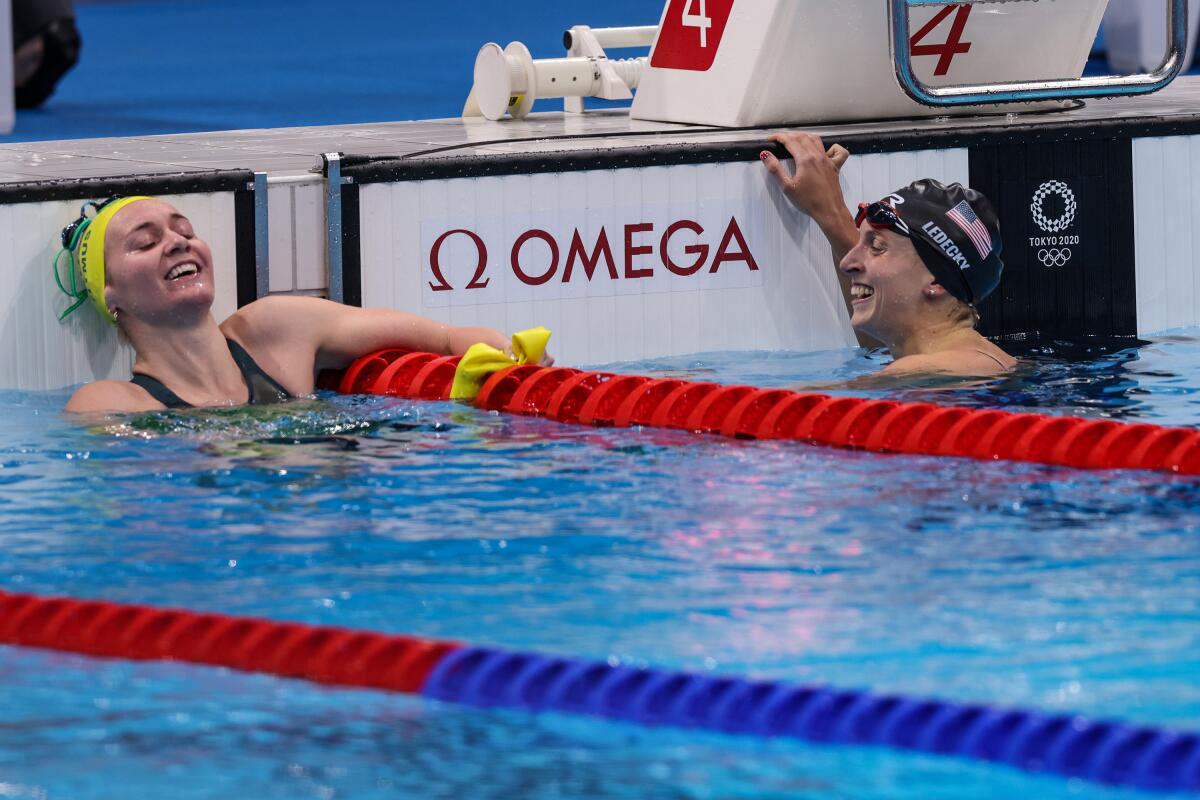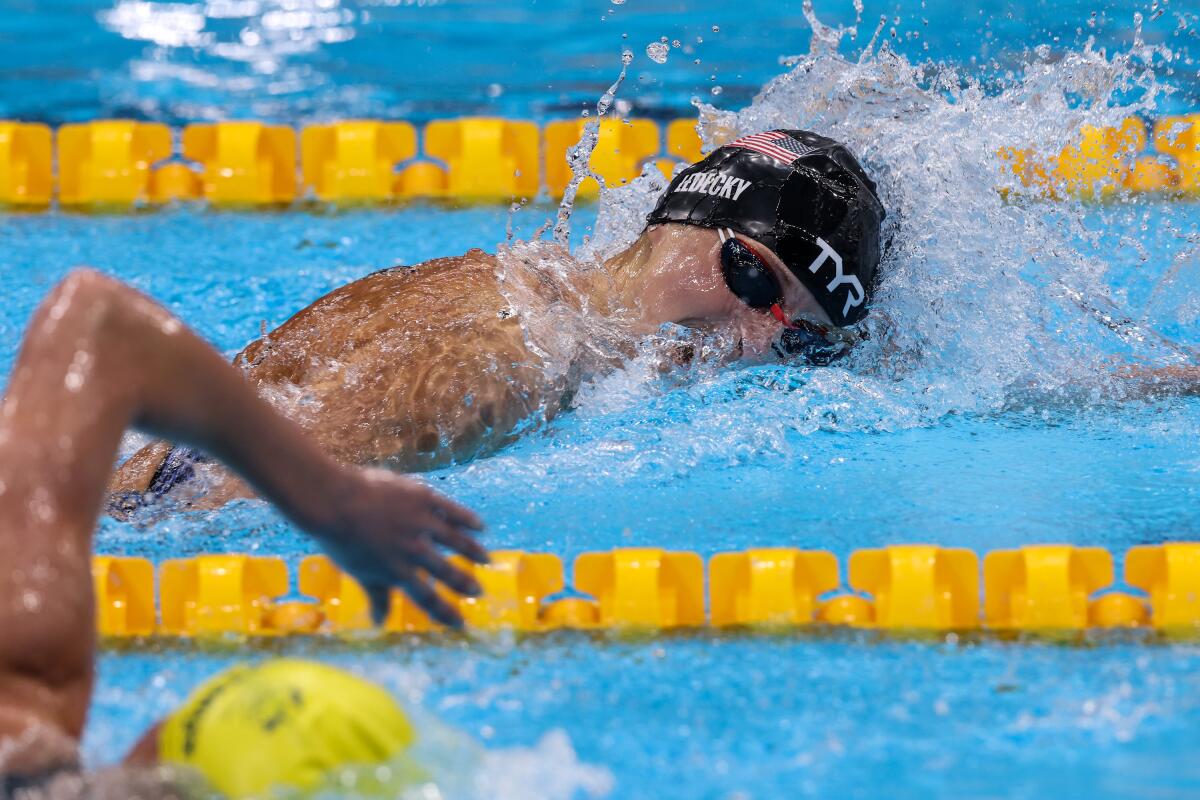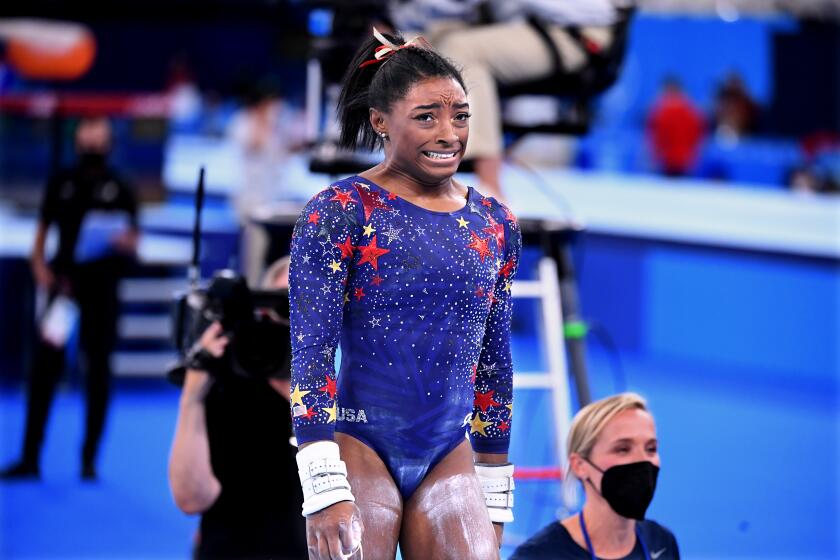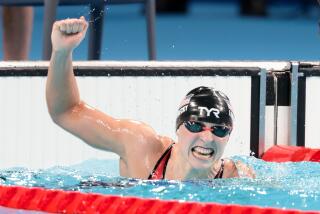Katie Ledecky’s dominance dashed by Australia’s Ariarne Titmus in 400 freestyle

TOKYO — For more than a decade, Katie Ledecky has dominated the pool like no other woman.
She piled up world records and gold medals, usually with jaw-dropping margins of victory that made her appear to be swimming a different race than the competitors fighting for second place.
But Ledecky’s invincibility vanished Monday against Australian sensation Ariarne Titmus in front of a few hundred athletes, coaches, journalists and officials at the cavernous Tokyo Aquatics Centre.
A U.S. women’s gymnastics squad that was considered head and shoulders above their rivals didn’t perform that way during Tokyo Olympics qualifying.
Titmus, nicknamed “The Terminator,” blew past Ledecky in the final stretch of the 400-meter freestyle to win gold in the most anticipated swimming final at these Olympic Games.
“It’s the biggest thing you can pull off in your sporting career, so I’m over the moon,” the 20-year-old Titmus said. “I’m trying to contain it as much as I can.”
Ledecky, 24, faced the unfamiliar position of accepting an individual silver medal: “I’ve had some tough ones over the years. It was certainly a tough race and I delivered. I couldn’t do much better than that.”
Entering the race, Ledecky had won all four of her Olympic gold medal races at the London and Rio de Janeiro Games. She owned 12 of the 14 fastest times in history in the 400, including the world record, to go along with world records in the 800 and 1,500 freestyles.
In the early stages of Monday’s final, Ledecky looked like she was on the way to a vintage performance. Her lead over Titmus grew to almost a full body length — about seven-tenths of a second — at 200 meters. Ledecky’s unusual blend of top-notch sprinting ability and the gift to handle long distances with ease, along with a textbook stroke and imperviousness to pressure, seemed to be combining, once again, to leave another would-be challenger struggling to catch up.

However, Titmus is unlike anyone Ledecky has encountered since establishing herself as the world’s preeminent female swimmer, someone for whom making history is as routine as springing off a starting block.
“Honestly, at the 200 meters, I was a bit worried, but I didn’t come to the Olympic Games unprepared,” Titmus said. “I had to trust myself and stay as composed as I could.”
She edged closer to Ledecky, then took the lead with 50 meters remaining and didn’t let up. Titmus finished in 3 minutes 56.69 seconds, the second-fastest time in history behind the record Ledecky set in Rio. The American was 0.67 seconds behind, the second-best mark in her career.
“I looked up at 300 meters and she was right there so I knew it would be a battle to the end,” Ledecky said. “I didn’t feel like I died or really fell off. She just had a faster final 50 meters or 75 meters and got her hand to the wall first.”
The victory set off a frenzied celebration in the stands by Dean Boxall, who coaches Titmus. He screamed and punched the humid air repeatedly. Hopped around the concourse. Yelled. Flexed. Waved his long hair around. He looked like he was in a mosh pit as the handful of spectators looked on in amusement.
In other finals Monday, the U.S. men’s 400 freestyle relay, including star Caeleb Dressel, claimed gold, while Michael Andrew (100 breaststroke) and Torri Huske (100 butterfly) finished fourth in their races.
Ledecky and Titmus will meet in the coming days in the 200 and 800 freestyles. This wasn’t their first encounter in the 400. During the world championships in South Korea in 2019, Titmus blew past Ledecky in the final 50 meters of the 400 to win by more than a second.
Ledecky, it turned out, was suffering from a mysterious virus that resulted in a hospital visit and forced her to pull out of two races. But the performance by Titmus made clear she would challenge Ledecky’s dominance. The younger swimmer brought swagger in addition to speed, not hesitating to say that Ledecky didn’t frighten her.
Titmus missed three months of training this year with a shoulder injury, a potentially devastating development in the lead-up to the Games.
Whatever questions surrounded her health disappeared at Australia’s Olympic trials last month when she clocked the second-fastest 200 and 400 freestyles in history.
Ledecky, who is still the heavy favorite to win gold in the 800 and 1,500, recorded the top preliminary time in the 400 on Sunday, while Titmus was third.
“I’d like to think I’ve got a bit more in the tank for the final,” Titmus said afterward.
She was right.
More to Read
Go beyond the scoreboard
Get the latest on L.A.'s teams in the daily Sports Report newsletter.
You may occasionally receive promotional content from the Los Angeles Times.










